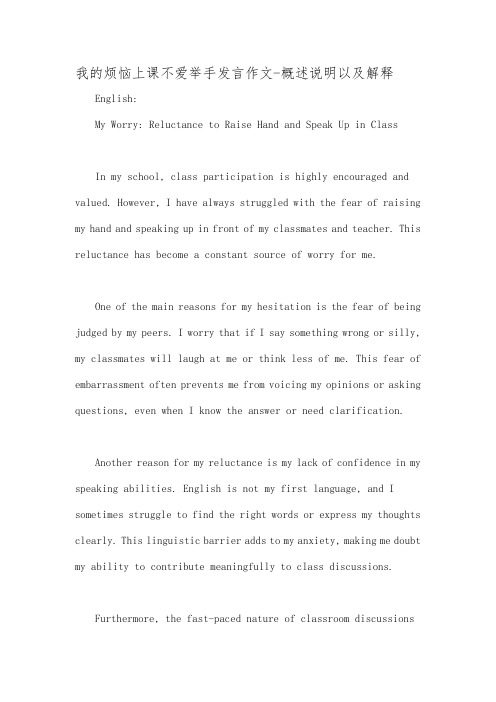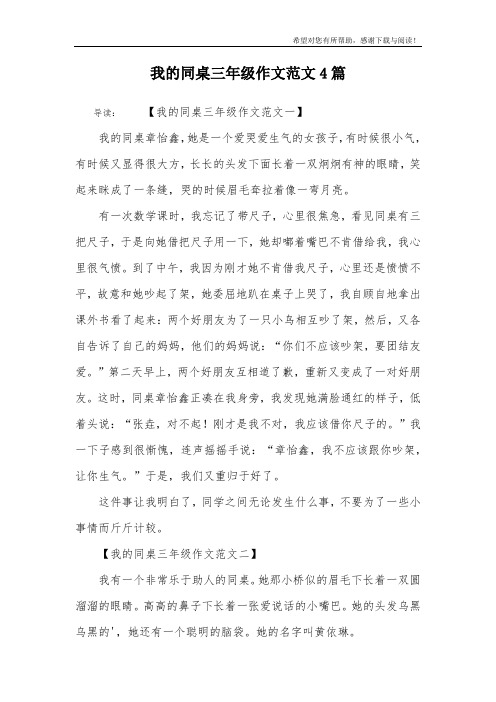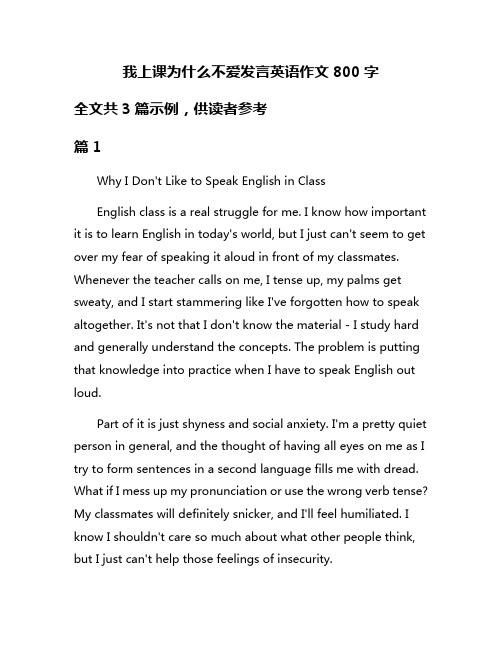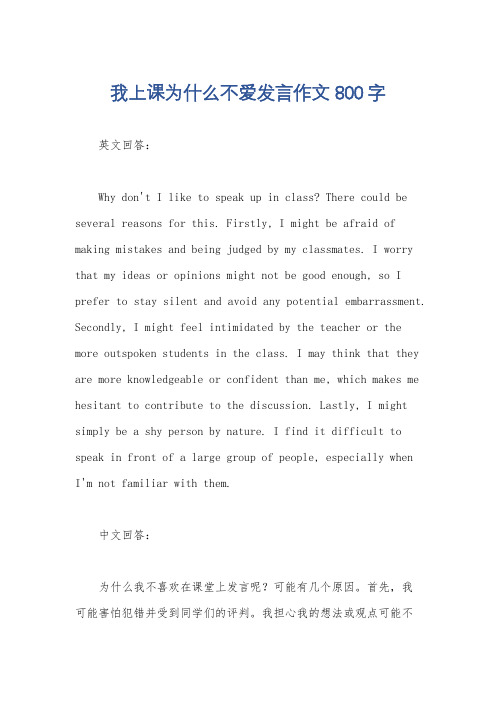上课不爱发言作文
自己的优点作文300字(精选10篇)

自己的优点作文300字自己的优点作文300字(精选10篇)自己的优点作文300字篇1我的优点是:爱帮助同学、爱劳动、尊老爱幼、讲卫生和讲礼貌我的缺点是:学习粗心大意、不够细心、自己的事情不能自己完成,老是依赖妈妈和婆婆、有时候还不听爸爸妈妈的话,让他们很生气。
爸爸和妈妈说我要好好发扬我的优点,慢慢的把自己的缺点都改掉,争取做一个“三好学生”。
我的缺点也不少,不爱说话,上课也不爱发言,发言声音也不大,回家做作业也不自觉,总是让妈妈三催四催。
我的胆子也小,遇到不懂不会的题也不敢问老师。
吃饭的时候还总喜欢一边看电视,一边吃饭。
因为这些缺点妈妈没少批评和教育我,也经常鼓励我积极发言,不会的题要及时举手问老师。
人不怕有错,就怕知错不改。
所以我要改掉不好的习惯,改正缺点,发扬优点。
自己的优点作文300字篇2翻开《鸟》一书,首先映入眼帘的是《鸽子与老鹰》的文章;我兴致勃勃地读起来……众所周知,鸽子是一种温顺的鸟类,象征和平,与人类是好及朋友,在古代就有人利用鸽子识途的优点来飞鸽传信;而鹰是一种凶猛的飞禽,锋利的喙,烔烔有神的目光,高超的飞翔技术……当鸽子遇见老鹰,会慌不择路,向下逃去,而老鹰则用俯冲时巨大的摩擦力和冲击力,轻松抓住了鸽子;相反,科学家经实验证明,鸽子向上滑行的速度极快,鹰几乎不可能和鸽子相提并论。
鸽子遇到鹰如果反其道而行之,才能获救啊!在生活中,就有许许多多这样的事。
从鲁迅弃医从文,到比尔。
盖茨弃学从商,这不都是发现了自己的长处吗?我以前水粉画有一个朋友,他把颜料弄得一塌糊涂。
后来他去学素描,竟获得了8级证书。
这就是他的优点所在。
生活中,缺点是必然有的。
但要发挥自己的优点,扬长避短。
如果硬把优点掩饰,缺点显露,那你未必太“谦虚”了。
要发现自己的优点并充分利用,才能让自己更加完美。
优点长处,发挥到极致,美好将会永存!自己的优点作文300字篇3有这么一个人,我对她再熟悉不过了。
她的爱好有很多,绣花就是其中的一个。
与众不同的我作文男生

与众不同的我作文男生
【篇一:与众不同的我】
在这世上,每一个人都是独一无二与众不同。
每个人的性格和爱好肯定也不同,在这其中就包括我。
我性格很内向,不爱说话,上课很少发言,而且我说话声音很小。
同时,我不喜欢热闹的地方,我只想在安静的地方看看书或者写写作业。
不仅如此,我还特别的胆小,我最害怕的东西就是虫子。
比如有一次,我和几个朋友去上山玩。
在上山时,天空中飞着许多蜜蜂,我不停得用手拍打着那些蜜蜂,生怕被蜜蜂蛰一下。
如果,什么虫子飞在我身上我就会更加害怕,肯定会大叫一声:哇有虫子啊!
每个人都有爱好,我肯定也有,我的爱好就是画画。
每次到暑假,我一定要做的事就是去画画班。
如果我妈妈不让上画画班,我会急发疯的。
我不光在画画班画画,平时闲的没事的时候我还会在家里画上几张画。
但是,我还有个最致命的缺点,那就是我爱哭。
让我哭的原因有很多很多。
比如别人打我了或者考试不好了,从小到大,我都不知道我哭了多少次了。
但是要比别人哭的次数要多几十倍。
因此大家都叫我爱哭鬼。
这就是与众不同的我。
我性格内向胆小还爱哭。
为此不知受了多少批评。
多少嘲笑。
我发誓我一定要改变我的性格。
介绍自己的优点和特长二年级作文

介绍自己的优点和特长二年级作文全文共5篇示例,供读者参考介绍自己的优点和特长二年级作文1我的手就又细又长,漂亮极了,让班里的同学无不起羡慕之心。
前几天,我恰巧发现了自己手上的一个绝技:可以直着把手往前扳,知道手碰到胳膊。
手的中间形成了一个美丽的三角形,这使同学们更加羡慕了,纷纷试试,但是无一成功。
我对她们说:“你们要善于发现哦,说不定也会发现自己手上的绝技。
加油!”一直有点儿自卑的同位,终于按撩不住了心中的疑问,急忙就问:“莹,你能教教我你是怎样练的绝技吗?”我听后莞尔一笑,思考片刻后对他说:“其实,我也没有练,每个人的手都有不同的特点。
就像我的手很长,所以才可以向前掰的。
你呢,只要有一双善于发现的眼睛,发现你自己手上所拥有的长处。
”他听完我的话,若有所思地点点头,然后就试验起来了。
我看见他左掰掰自己的手,右掰掰自己的手,突然像发现新大陆似的。
只听他开心地大叫一声:“哦,我发现了手上的绝技了!”我的目光又一次落在了同位的'身上,同位高兴地笑着,边笑边做给我看,原来他的小拇指上面那一节可以向左右转。
我微微一笑,对他说:“你看,只要你善于发现,就会发现自己其实是一块闪闪发光的金子哦!”同位听后开心地笑了。
这种事,在学习上不也是这样吗?就像书中的一句话:世界上不缺少美,而是缺少发现美的眼睛。
是呀,只要你善于发现自己身上的特点,就不会自卑。
老师所说的差孩子,他们也是有自己的长处的。
只有学会发现自己的长处,才会变得自信;只有学会发现自己的长处,才会懂得自己的珍贵;只有学会发现自己的长处,学会尊重自己,才能让别人也尊重你!要记住这样一句话:善于发现自己的长处!介绍自己的优点和特长二年级作文2我没有月亮的皎洁,却可以拥有群星的闪烁;我没有雄鹰遨游天空的羽翼,却可以拥有鱼翔浅底的快乐,我不是全方位的能人,却可以点燃自己的优点,绽放属于自己的光彩。
龟兔赛跑,我暂且不论谁最先到达终点而应关注他们到达终点的方式:鸟龟在跑步方面肯定会输于兔子,所以它选择它最擅长的游泳;兔子不会游泳,所以发挥跑步特长为目标而奋斗。
孩子上课不爱发言汇总一篇

孩子上课不爱发言汇总一篇孩子上课不爱发言 1陈乐上小学三年级了,喜欢看书,活泼好动,但却少言寡语,上课不爱发言,语词贫乏,喜欢以动作或手势来替代说话,因此常受到同学的嘲笑。
陈乐的父母怀疑他有发音系统的障碍。
经检查发现陈乐的发音系统完全正常,问题原来出在听- 说结合能力的'落后上。
也就是说他听说信息通道的语言发讯过程出现了问题。
我们已经知道听说结合能力是指儿童有能力听懂别人所说的话,并能做出较复杂而有意义的语言反应的能力。
它是人们成功沟通的基矗听说结合能力涉及到人的联想、推理及判断多种能力。
因此,我们对儿童听说结合能力的训练也可以此为基础来选择方法。
1. 相似与相反词的训练。
儿童学说近义词、反义词,一方面可以增加儿童的词汇量,学会灵活的语言表达,另一方面可加强儿童思考和用口语反应的能力。
2. 完成句子的训练。
这种训练可帮助儿童用完整而有意义的句子做口语式的表达。
具体方法是:先提供一个未完成的句子,让儿童补充完善。
如,天是__(蓝的)。
语句设计原则应先从儿童较熟悉、感兴趣、简单、所需补充字数较少者开始,逐渐增加句子难度。
3. 自编故事结局。
当儿童在完成句子一项做得较好后,我们可以通过训练儿童自编故事结局来进一步提高他们语言表达的能力。
它可以训练儿童注意听故事的细节,清楚了解内容,还能训练儿童的逻辑思考、推理、判断及想象力。
具体做法是:家长先给儿童说一个情节简单的故事,但没有结尾,请儿童把故事继续完成。
逐渐增加故事的复杂性,并鼓励儿童对同一故事编出不同结尾。
4. 听音乐说故事。
可先录制一些较具体易分辨的声音,并将这些声音排成先后顺序,如:婴儿哭、脚步声、呼唤婴儿名、婴儿笑声,播放给孩子听,要求他将这些声音编成故事。
进而有选择地让儿童听一些节奏清晰的乐曲,想象、猜测乐曲所表达的意思。
这种训练有助于提高儿童分辨声音的能力、想象力及__语言进行表达的能力。
除上述的一些具体训练方法外,家长应尽可能多地与儿童交谈。
写自己的作文500字

写自己的作文500字写自己的作文500字7篇学会享受生命,爱坚强的自己,会保存路途深处的凝望,守侯身边每一份执着的过往。
下面是店铺为你整理的写自己的作文,希望能帮到你哟。
篇一:写自己的作文我叫唐颢嘉,已有七岁半。
瘦瘦的个子,显得精干利落。
镜子里的我,留着一个小平头,两道乌黑的眉毛,一双炯炯有神的大眼睛,直挺的鼻子下面正张着嘴巴大笑,虽然因为换牙有几颗不好看的牙齿,但是掩盖不了我脸上那个圆圆的小酒窝,很讨人喜欢!我是全家人的“掌上宝贝”,每逢暑假,爷爷奶奶都要带我出去旅游,我很能干,也很勇敢,我才几岁,都算得上的小小旅行家了。
三岁时我到过爷爷老家喂牛、爬山,奶奶说那是体验山区生活。
那一年我们还去了北京,参观了天安门、故宫,最让我记忆犹新的是登长城,小小的我竟然爬上了八达岭长城,还得到了“不到长城非好汉”的证书和奖牌。
四岁时我们去了沙坡头,体验了骑骆驼、滑沙、坐沙漠越野车的乐趣。
五岁时我们去黄角树大瀑布,小屁孩的我竟然和大人们一起穿过瀑布——水帘洞而没有被吓到。
六岁时我们去了东北,到过大连的海洋动物园,看见了很多惊险的生活在海底的动物。
还去了哈尔滨的东北虎林园,我亲眼目睹了老虎吃鸡的凶残,我为那只被老虎咬断脖子的小鸡而难过了很久。
在太阳岛冰雪艺术馆,那是正处高温时节,可是馆内却冷气袭人,令人发抖,小小的我和大人们一样,穿上棉衣忍受着寒冷慢慢欣赏艺术家们的冰雕艺术。
这就是我,既能干又勇敢的我!夸夸我吧!篇二:写自己的作文有这么一个人,我对他熟悉得不能再熟悉了。
他呀,矮矮的个子,一张小小的瓜子脸,淡淡的眉毛下长着一双从早到晚都像没有睡醒似的眼睛。
惹人发笑的是,他虽读小学三年级了,但还像幼儿园的娃娃一样,无论穿什么裤子,老扎不紧,常常连屁股都露了出来,让在场的老师和同学笑掉大牙。
每当这时,他却毫不在乎,只见他提提裤子、扭扭腰身,便一溜烟地钻进人堆中去了。
别看他矮小和随便,可他非常聪明,接受能力也很强。
在学校,他参加了手风琴学习班。
我最爱的老师作文15篇

我最爱的老师(lǎoshī)作文15篇我最爱的老师(lǎoshī)作文15篇我最爱的老师(lǎoshī)作文1我最爱的老师是班主任杜老师,她叫杜楠。
她是我们的数学老师。
她大大的眼睛,高高的鼻梁,小巧的嘴巴,说起话来声音非常甜美(tiánměi),我很喜欢她,也很爱她。
我爱她讲得生动有趣的数学课。
每次她上课时教室内非常安静,同学们都目不转睛地盯着黑板,生怕漏掉一点点知识。
她讲课时总是把书中的知识和生活实际(shíjì)联系起来,使抽象的数学变得生动有趣,这样我们很容易明白,更加深了记忆。
我爱她教我们做人的道理。
她经常教育我们“为人处世一定要老实,要做一个善良、勤奋、开朗、乐于助人的好孩子〞。
她说,“我们班42个同学就象一个大家庭,大家一定要互相关心、互相帮助〞。
我爱她在生活中关心我们就象妈妈一样。
有一次我生病了,休息了几天,在这期间杜老师打了好几次电话问候我,并嘱咐我好好养病,不要着急,那温柔的声音使我感觉就象妈妈一样。
在我病好后,又主动利用业余时间帮我把这几天落的课补上,使我赶上了同学们。
还有一次,我数学测验成绩不太好,杜老师利用课余时间主动帮我分析原因,找出存在的问题,使我很快把这局部知识补上。
在她的教育和帮助下,我学习有了很大的进步,荣耀地参加了少先队,获得了“三好〞学生、“阳光少年〞的荣耀称号,又被评为学习委员。
我真庆幸选择了师大二附小这所学校,更庆幸遇上了杜老师这样的好老师,我一定要好好学习,做一个德、智、体、美、劳全面开展的好学生。
我最爱的老师作文2老师,就像一根蜡烛,照亮了我们,燃烧了自己;老师,就像是甘甜的雨露,滋润了我们;老师,就像是天上的秃鹰,教会我们展翅飞翔。
如今,我虽已步入了中学的殿堂,但却仍然无法忘记您,任老师。
她有着一头棕色的长卷发,两道又细又长的眉毛下,有着一双炯炯有神的大眼睛,高挺的鼻梁下有着一张能说会道的嘴巴。
她虽然很严厉,但也很温柔。
我的烦恼上课不爱举手发言作文

我的烦恼上课不爱举手发言作文-概述说明以及解释English:My Worry: Reluctance to Raise Hand and Speak Up in ClassIn my school, class participation is highly encouraged and valued. However, I have always struggled with the fear of raising my hand and speaking up in front of my classmates and teacher. This reluctance has become a constant source of worry for me.One of the main reasons for my hesitation is the fear of being judged by my peers. I worry that if I say something wrong or silly, my classmates will laugh at me or think less of me. This fear of embarrassment often prevents me from voicing my opinions or asking questions, even when I know the answer or need clarification.Another reason for my reluctance is my lack of confidence in my speaking abilities. English is not my first language, and I sometimes struggle to find the right words or express my thoughts clearly. This linguistic barrier adds to my anxiety, making me doubt my ability to contribute meaningfully to class discussions.Furthermore, the fast-paced nature of classroom discussionsintimidates me. Often, by the time I gather the courage to raise my hand, the topic has already moved on, and I feel like my input would be irrelevant or redundant. This further discourages me from actively participating in class.To overcome these challenges, I have been trying various strategies. Firstly, I remind myself that making mistakes is a natural part of the learning process and that my classmates are likely to be supportive rather than judgmental. I also practice speaking in front of a mirror or with a trusted friend, which helps boost my confidence and improve my fluency.Additionally, I make a conscious effort to prepare for class discussions by reading ahead and formulating my thoughts in advance. This preparation allows me to feel more confident in contributing to the conversation and ensures that my input is relevant and valuable.Lastly, I have sought support from my teachers, who have been understanding and encouraging. They have provided me with opportunities to speak in smaller group settings or one-on-one, which has helped me gradually build my confidence and overcome myfear of speaking up in class.Though my reluctance to raise my hand and speak up in class continues to be a challenge, I am determined to overcome it. With perseverance and support, I believe I can gradually become more comfortable and actively participate in classroom discussions.中文:我的烦恼:不爱举手发言上课在我的学校里,鼓励并重视课堂参与。
可爱的自己作文范文(精选26篇)

可爱的自己作文可爱的自己作文范文(精选26篇)在日常的学习、工作、生活中,大家都经常接触到作文吧,作文根据体裁的不同可以分为记叙文、说明文、应用文、议论文。
那么一般作文是怎么写的呢?下面是小编帮大家整理的可爱的自己作文范文,仅供参考,大家一起来看看吧。
可爱的自己作文篇1我叫程欣悦,今年九岁了。
我属蛇,我是一个可爱的小女孩。
我有一张圆圆的脸,在浓浓的眉毛下,长着一双水汪汪的眼睛,不高不矮的鼻子下面,长着一双能说会道的嘴巴。
我的嘴巴很甜,见人就喊,邻居的那些奶奶们都夸我有礼貌。
我平常总喜欢扎一个蜗牛辫,辫子上面扎一个喜羊羊的花结,头上还带有一个白色的水钻发夹,这样感觉很清爽,也很舒服。
我喜欢弹古筝,也喜爱书法。
每当我戴上指甲弹古筝,听见这么美妙、动听的声音被我从琴弦中弹出来,虽然不会像老师弹的那么熟练,那么好听,但我还是认为自己是很棒的。
我也经常给自己加油。
我也喜爱书法。
妈妈叫我写字的时候,一定要注意姿势。
她希望我能写出一手漂亮的毛笔字和钢笔字。
我也正向着这个目标努力呢。
这些也都是我的一些爱好。
但我认为,最主要的还是要好好学习。
上课的时候,我很认真听老师讲课,我唯一的缺点就是胆小。
在举手的时候不积极,在回答问题时声音很小。
但这一次我对自己充满了信心,一定要改掉这个缺点。
看,这就是可爱的我,你们喜欢我吗?可爱的自己作文篇2我,一个可爱的小女孩。
下面就让我来介绍一下我自己吧。
我长长的头发,圆圆的脑袋,小小的鼻子,红红的嘴巴,可爱极了。
我爱看书,经常会因为看书而当误时间。
有一次吃饭,妈妈不知叫了我多少遍,我随变说到:知道了。
最后,我慢吞吞的走进厅,结果一头撞到客厅墙上。
这就是我,你喜欢我不?可爱的自己作文篇3我是一个快乐的女孩,长得瘦瘦的,最爱穿牛仔裤,还扎着一个“马尾巴”。
我爱唱歌、跳舞、绘画、读书。
尤其是读书。
有一次,我在看《上古神话》,妈妈忽然在厨房里喊:“昕昕,去买一袋盐!”“知道了!”我答道。
但屁股一点也不肯挪动。
我的同桌三年级作文范文4篇

我的同桌三年级作文范文4篇导读:【我的同桌三年级作文范文一】我的同桌章怡鑫,她是一个爱哭爱生气的女孩子,有时候很小气,有时候又显得很大方,长长的头发下面长着一双炯炯有神的眼睛,笑起来眯成了一条缝,哭的时候眉毛耷拉着像一弯月亮。
有一次数学课时,我忘记了带尺子,心里很焦急,看见同桌有三把尺子,于是向她借把尺子用一下,她却嘟着嘴巴不肯借给我,我心里很气愤。
到了中午,我因为刚才她不肯借我尺子,心里还是愤愤不平,故意和她吵起了架,她委屈地趴在桌子上哭了,我自顾自地拿出课外书看了起来:两个好朋友为了一只小鸟相互吵了架,然后,又各自告诉了自己的妈妈,他们的妈妈说:“你们不应该吵架,要团结友爱。
”第二天早上,两个好朋友互相道了歉,重新又变成了一对好朋友。
这时,同桌章怡鑫正凑在我身旁,我发现她满脸通红的样子,低着头说:“张垚,对不起!刚才是我不对,我应该借你尺子的。
”我一下子感到很惭愧,连声摇摇手说:“章怡鑫,我不应该跟你吵架,让你生气。
”于是,我们又重归于好了。
这件事让我明白了,同学之间无论发生什么事,不要为了一些小事情而斤斤计较。
【我的同桌三年级作文范文二】我有一个非常乐于助人的同桌。
她那小桥似的眉毛下长着一双圆溜溜的眼睛。
高高的鼻子下长着一张爱说话的小嘴巴。
她的头发乌黑乌黑的',她还有一个聪明的脑袋。
她的名字叫黄依琳。
有一天早上,我起得太迟了,就匆匆忙忙地背着书包来到了学校。
来到了学校的班级里。
我们班的语文老师胡赛多来了,胡老师手晨拿着一本语文书和两支水笔。
我看到了这两样东西就想到:“我的铅笔盒和语文书好像没带一样。
”于是,我马上开始搜我的书包。
过了一会儿,我搜遍了整个书包果然没带铅笔盒和我的语文书。
上课了,我开始是紧张了。
我心里想:如果被老师发现了那就完蛋了。
我的同桌黄依琳看我那紧张的样子就说:“你没带语文书和铅笔盒我借你吧!”我听了连忙说了声:“谢谢!”这就是我的同桌,乐于助人的同桌同学。
【我的同桌三年级作文范文三】我的同桌在班里是个体育明星,他在上次秋季运动会上大显身手,跑步得了全年组第一名。
上课不爱发言作文

上课不爱发言作文毛甸子学校姜丽一、研究背景有人曾经说过,“质疑是人的思维走向深刻的开始。
”我认为当一个孩子开始质疑的时候,已经充分的说明,他在听课,他在思考。
这是他进步的表现,可是却有很多同学上课不喜欢发言,他们把自己的想法放在心里,不去表达。
这样,隔断了他们前进的步伐。
因此学生能否主动发言是能否成功的关键。
作为教师的我们怎样纠正学生上课不爱发言的习惯呢?这个问题尤为关键。
二、研究目标在平时工作中我发现不擅长发言的孩子一般有三大类:一是孩子胆子小,害怕教师,也害怕去表达自己的想法;二是孩子的性格内向,比较腼腆,害羞,太在乎其他同学的想法,害怕被嘲笑,不喜欢发言;三是孩子缺少方法,不会组织自己的语言,不知道该怎么去表达自己的想法。
我想,如果我们能纠正学生上课不爱发言的习惯,那么学生会变得非常优秀。
乐于表达自己,语言能力会进一步的提高,更进一步增加学生语文学科的成绩,作为学生,成绩对他来说很是重要,这样更能激起他学习的乐趣以及信心;爱发言,会使他很乐于和他人交谈,会是他有很多朋友,也会激起身边的人交流,远离手机,乐于人与人的交流;胆子变大,更加勇敢,更加自信而强不可摧。
三、研究对象、方法课题研究对象:初中学生,主要实验对象为八年级学生。
课题研究方法:采用行动研究法、调查法、实验法等方法来进行研究。
1、运用群体优化法,课题组成员分工负责研究内容,有分有合。
2、每组设置岗位,不同成员不同分工。
使得每个人都有价值。
3、调查法:通过听课、问卷调查等手段搞清目前初中物理课堂教学现状。
4、资料法:利用图书馆和校园网,查阅有关资料,借助前人的理论和经验,指导我们的实验研究,为课题研究提供丰富详尽的背景资料,并更新了课题组成员的教育观念。
四、研究内容及措施课题研究的主要内容1、与教师学习有关。
每次我们我们探究的过程也是我们进步的过程。
课题研究成功与否,与课题研究成员的素质有很大的关系。
为提高课题研究人员的素质,尽快掌握教育研究方法,我们将组织成员认真学习课题研究方案、自学相关理论知识。
我心目中的好老师作文800字【精选6篇】

我心目中的好老师作文800字【精选6篇】无论是身处学校还是步入社会,大家总少不了接触作文吧,作文要求篇章结构完整,一定要避免无结尾作文的出现。
为了让您在写作文时更加简单方便,以下是人见人爱的小编分享的6篇我心目中的好老师作文800字,在大家参考的同时,也可以分享一下牛牛范文给您的好友哦。
我心目中的好老师作文篇一在我心中,有一位老师是我最喜欢的一个老师,她长得漂亮,话语风趣,还很尊重学生。
上课时,老师常常让我们闭上眼来想象课文情节,有时候还会叫几个同学来表演一些课文里的动作、词语和情景,让我们在了解课文之余又多了份上课堂的情趣。
有时,老师又用幽默一下来调整上课的气氛,使得我们整堂课都可以保持最佳的学习状态。
下课时,老师和我们就成了朋友。
想说什么就说什么,相互之间全然没了老师和学生之间的界限,只有好朋友之间的那种信任和亲密。
可是虽然如此,我们的这位老师却也不是好欺负的,你别看她平时很温柔,可是一旦我们班哪个同学作业好没写或打架等等,这位老师就会严厉地采取以下措施进行整治。
比如是第一第二次犯,老师就会批评说教,并给予及时改过的机会,将我们的错误扼杀在萌芽状态。
若是次数较多,老师就会叫我们写检讨书彻底反思……但无论如何,我们老师绝不会体罚我们,因为老师说过我们是她最爱的孩子,她说我们都是懂事的孩子。
比如前几天,老师一早高高兴兴来上课。
课前,她按惯例先询问我们的作业情况。
结果,那几个较“顽固”的同学再次站了起来。
老师一看又是这几个淘气包,脸上顿时没了笑意,严厉地通知了那几个同学下课后到办公室谈话。
开始上课了,我们原以为老师的坏情绪会影响课堂,可没想到老师还是延续了一如既往的那种风趣与轻松。
上课的时间又像往常一样悄悄地溜走了,直至下课的铃声响起,才把我们从优美的课文中拉回现实。
课后,那几个作业没写的跟着老师一起去了此刻令人望而生畏的办公室,我和几个看热闹的同学也行色匆匆地也跟了过去,心里暗暗窃喜:哈哈,你们都故态重演过好几次了,这回老师总不会轻易放过了吧?在门外,我隐隐约约地听见老师问他们为什么不写作业,然后老师说这次要重罚了,叫他们每人写一份两百字的的检讨书,检讨书的内容包括……“哇,老师的忍耐力可真强,”我不无敬佩地说道:“老师还真是爱我们这帮学生啊!”后来这几个同学出来了,我们也一改看热闹的心态,纷纷给他们说起中肯的意见来……介绍到这,我想你们一定已经知道我心中的这位漂亮、风趣、仁慈偶尔会生气的老师是谁了吧?对极了,她就是我们全班每个人心中最喜欢的——冯老师!我心目中的好老师作文800字篇二老师是辛勤的园丁,浇灌了我们这些祖国的花朵,让我们茁壮地成长;老师是远航的帆船,带领我们在知识的海洋中自由遨游,驶向成功的彼岸。
我的缺点作文

我的缺点作文在平时的学习、工作或生活中,大家都不可避免地要接触到作文吧,通过作文可以把我们那些零零散散的思想,聚集在一块。
如何写一篇有思想、有文采的作文呢?下面是店铺为大家收集的我的缺点作文,欢迎阅读与收藏。
我的缺点作文1人不是十全十美的,人有优点,也有缺点。
今天,我就来写写我的缺点。
看到这里,你肯定会想:这个真是笨,放着好好的优点不写,偏偏要写自己的缺点。
如果你真的是这样想的话,你就没有必要在把这个文章看下去了。
我有两大缺点:1.爱哭。
我只要遇到些不顺心的事时,就控制不住眼泪,“吧嗒吧嗒”地流下来了。
2.懒。
每天早上,妈妈把我叫醒,正开朦胧的睡眼,第一句话就是;“妈妈,帮我拿衣服和袜子。
”穿好衣服后,连被子也不叠就来到了客厅。
“妈妈,给我拿筷子!”吃过饭后梳好头,正准备上学时被妈妈叫住了:“怎么连被子也不叠,回来叠被子!”我小声嘟囔着:“叠好中午还得盖,中午睡觉后还得叠,晚上又得盖,何必要叠起被子来呢?”来到卧室,我把被子大展开,铺平了放到床上,便偷偷逃跑了。
我可是下定决心要改掉我的缺点的,请朋友们来帮一帮我吧!我的缺点作文2我叫张靖朋,是个男生,今年八岁了。
在新乡市第一实验学校上学,是三年级学生。
我有一对弯弯的眉毛,一对明亮的眼睛。
身上穿着一堆蓝圆点的红色上衣,底下穿着一条牛仔裤,脚上有一双运动鞋。
我有一个缺点是爱读书:有一次,下课了我拿出一本课外书开始读书了。
正当我读到地震的时候,突然,我感觉地面晃了晃我以为是地震所以就喊了一声:“地震了!”当我喊完的时候,我发现有两个男生在打闹。
我心想:可能是他们在打闹的时候不小心震了我一下,所以我感觉地震了。
我就又坐下读书了。
我还有一个缺点就是爱玩电脑。
有一次早上我起床后,就开始玩电脑。
我越玩越入迷,玩了一大会之后,我觉得有点饿于是想起餐厅找点吃的。
到了餐厅,我发现有一碗早餐我问妈妈:“这是谁的早餐?”妈妈说:“你的。
”我忽然想起来早餐没吃。
这就是我的缺点做一件事好入迷。
我为什么上课不爱发言英语作文八百字

全文分为作者个人简介和正文两个部分:作者个人简介:Hello everyone, I am an author dedicated to creating and sharing high-quality document templates. In this era of information overload, accurate and efficient communication has become especially important. I firmly believe that good communication can build bridges between people, playing an indispensable role in academia, career, and daily life. Therefore, I decided to invest my knowledge and skills into creating valuable documents to help people find inspiration and direction when needed.正文:我为什么上课不爱发言英语作文八百字全文共3篇示例,供读者参考篇1Why I Don't Like to Speak English in ClassEnglish class has always been a struggle for me. Don't get me wrong, I actually really enjoy learning the language itself. I find the grammar fascinating, the vocabulary words intriguing,and the literature we read engaging. However, when it comes to actively speaking English out loud in front of my classmates, an overwhelming sense of dread and anxiety washes over me. Let me explain why speaking up fills me with such trepidation.Firstly, I've always been a bit of a shy and introverted person, even when speaking my native language. There's just something about being the center of attention that makes me want to shrink back into my shell. Speaking in front of a group triggers an intense fear of being judged, laughed at, or embarrassing myself. I tend to overthink every word that comes out of my mouth, mentally critiquing my pronunciation, grammar, and vocabulary choices. This excessive self-consciousness inevitably leads to bouts of stammering, long awkward pauses, and flushed cheeks as the eyes of my peers bear down on me.Secondly, I worry endlessly about making mistakes when speaking English. Unlike writing, where I have time to carefully craft each sentence, speaking requires spontaneous thoughts to be instantly translated into coherent speech. One tiny slip of the tongue and I'm plagued with doubts about whether I've just butchered the entire language. I envision my classmates snickering at my errors, the teacher giving me a disapproving look, and a general sense that I've failed at properlycommunicating. This fear of failure is so pervasive that I often remain silent, even when I know the answer, rather than risk humiliating myself in front of everyone.Another factor contributing to my reluctance is the perceived fluency disparity between myself and some of my peers. There are definitely a handful of students in my English class who seem to speak the language effortlessly, as if they were native speakers. Listening to them articulately express themselves, utilizing advanced vocabulary and proper intonation, I can't help but feel inadequate by comparison. My sentences come out disjointed and simplistic, my pronunciation is sloppy, and finding the right words is a constant battle. Publicly displaying my weaknesses next to their strengths is something I dread.Moreover, English class tends to revolve heavily around impromptu speaking activities like opinon sharing, debates, and presentations which fill me with absolute panic. Having only a few moments to gather my thoughts in a second language puts intense pressure on me. Inevitably, my mind goes blank and I'm left floundering, unable to effectively communicate even basic concepts, much to my frustration. The only way I've found to cope with these high-stress speaking scenarios is throughmeticulous preparation and practice in advance. However, in an academic setting where we're expected to think on our feet, such forethought isn't always possible.Finally, and perhaps most discouragingly, is the belief that my spoken English abilities are simply subpar compared to my written skills. While my writing is quite strong thanks to ample time for revision, my spoken communication remains a work in progress. I've been told by teachers that I have a tendency to directly translate thought patterns from my native tongue into English rather than fully adopting the unique language patterns and nuances. This makes my spoken English sound awkward, unnatural, and quite frankly, not up to the standards I hold myself to academically. The disconnect between how I envision I should sound versus how I actually come across is profoundly discouraging.So in summation, my apprehension surrounding speaking English out loud stems from introversion, fear of failure, comparing myself to more capable peers, the immense pressure of impromptu speech, and frustration with my seeming inability to match my writing abilities verbally. I recognize that pushing through this anxiety and consistently practicing spoken English is crucial for achieving true mastery of the language. However, oldhabits and insecurities often win out, reducing me to pensive silence in class.Perhaps with time, patience, and a more supportive environment that celebrates students' efforts over perfection, I can overcome this overpowering speaking phobia. Until then, you'll likely find me desperately avoiding being called on to ensure another class period goes by without enduring the dreaded scrutiny of attempting to speak English in front of my peers.篇2Why I Hate Speaking English in ClassLet me start by saying that I totally get the importance of practicing English, especially speaking it out loud. Our teacher is always going on about how the only way to really improve is by using the language, making mistakes, and learning from them. And yeah, I know jobs these days want people who can communicate well in English. But holy awkwardness, I absolutely dread having to raise my hand and speak in front of the whole class.There are just so many ways it can go wrong! First off, there's the fear of making a silly pronunciation mistake and everyonesnickering. I study the vocabulary really hard, but sometimes those weird English sounds just won't come out right. And don't get me started on those tongue-twisters my teacher loves torturing us with for "pronunciation practice." Those are designed to make everyone sound silly.Then there are the dreaded grammar goofs. I have a decent grasp of English grammar in my head, but putting together a grammatically correct sentence to say out loud is a whole other struggle. Somehow the grammar rules I've learned just fly out of my brain when I'm put on the spot. I end up stammering and blushing furiously as I try to conjugate a verb properly.But probably the worst part is just the horrible feeling of having everyone's eyes on me while I'm struggling to express myself. Some of my classmates are so fast with English and make it look easy. For me, I have to slowly translate my thoughts in my head before I can say anything. So there's this torturous silence while I'm trying to arrange the words into something coherent. My palms get sweaty, my mind goes blank, and I can feel my face turning beet red.It's a vicious cycle too - the more I get nervous and start messing up, the more flustered I become. Which of course makes me mess up even more. By the end I'm just an incoherent,babbling mess desperate for the sweet release of being able to sit back down.I know my teacher means well and is just trying to give us opportunities to practice. But being called on to speak in front of everyone is just too much pressure! I inevitably freeze up and forget everything I've learned.There's a reason people have such a fear of public speaking - it's terrifying! I'm not alone either; I can see the same panic in a lot of my classmates' eyes when the teacher starts doing rounds of forcing everyone to answer questions out loud one-by-one. We're all just kids still learning; being put on the spot like that is just too harsh.Maybe if it were more casual conversations in like small groups it wouldn't be so bad. But having to formally speakone-at-a-time in front of the whole class is my own personal hell. Logically, I know it's good practice and no one really cares if I make mistakes. But tell that to my surging anxiety and impulse to simply shut down and never let a word pass my lips.I really am trying my best to improve my English skills, I swear! You'll never find me slacking on the written assignments or not studying. And I'm a great participant in class...when we're not being asked to speak. Group activities, fun games, watchingvideos, even just listening - I'm there and engaged 100%. It's just that having to formally speak out loud, with no preparation, trips some kind of freeze wire in my brain. My sentences turn to mush, and I start second-guessing every single word that tries to escape my mouth.So please, teacher, go easy on us when it comes toon-the-spot speaking practice! Or at least let us pass around a prop or ball or something, so we know when it's our turn to be in the hot seat. Surprise call-outs are the worst. Give us a chance to mentally prepare and get in the right headspace first. Maybe that will help short-circuit the panic response.I promise I'll keep working hard to get more comfortable with spoken English. But those super high-pressure situations are doing more harm than good for anxious speakers like me. With some adjustments and lower stakes, I'm sure I can get over this speaking phobia eventually. Let's just take it slow and take the terror out of terror-izing us with pop English conversations for now!篇3Why I Don't Like to Speak English in ClassI have to be honest – speaking English in front of my classmates is one of my biggest fears. I know I should practice more to improve my English skills, but every time the teacher calls on me, I freeze up. My palms get sweaty, my heart starts racing, and my mind goes blank. It's like some invisible force is blocking the words from coming out of my mouth.Part of the reason is that I'm just a really shy person in general. I've always been the quiet kid who prefers to blend into the background. Putting myself out there and being the center of attention, even for a brief moment, fills me with dread. What if I mess up my grammar or pronounce something wrong? What if everyone laughs at me? The thought of embarrassing myself in front of my peers is mortifying.I know that type of thinking isn't rational. My classmates are all in the same boat, learning English as a foreign language. They're not judging me any more harshly than I'm judging myself. We're all bound to make mistakes – that's just part of the learning process. But that doesn't make the anxiety any less real for me.Another factor is my lack of confidence in my English ability. Sure, I can read and write decently enough, but speaking is an entirely different skill. Stringing sentences together fluidly inreal-time while managing pronunciation, intonation, and grammar is incredibly challenging. I admire the kids who can just rattle off in English without skipping a beat, but that's definitely not me. I have to put so much conscious effort into every word that I end up stumbling over simple phrases that I know perfectly well.It doesn't help that I come from a family where English isn't spoken at home. My parents only know very basic English for things like grocery shopping. They tried to get me started with English education early on, but it was always an uphill battle since I couldn't practice conversationally. Even now, they don't really understand why it's so important that I become fluent. In their minds, getting good grades is what matters most, not oral communication skills.That mindset has definitely rubbed off on me over the years. I've internalized the idea that speaking English isn't as crucial as reading comprehension or writing for exams. It's the aspect of language learning that I've neglected the most. While my classmates were joining English clubs and conversing with each other, I was at home with my head buried in textbooks, believing that was the path to scholastic success.Looking back, I realize how misguided that approach was. No matter how skilled I become at the technical aspects of English, true mastery will always elude me if I can't speak it comfortably. It's like learning how to read music but never actually playing an instrument. Theoretical knowledge is important, but it's not the full picture.The older I get, the more I've come to appreciate how vital English communication skills are in our globalized world. Whether it's for higher education, careers, or just making connections across cultures, the ability to speak this universal language fluently is a game-changer. I can't afford to let my insecurities and self-doubts hold me back anymore.So even though it still fills me with trepidation, I'm making a conscious effort to volunteer answers and push myself to speak up more during English class. It's a slow process of exposure therapy – getting comfortable with being uncomfortable, if that makes sense. I try to be pragmatic and recognize that any laughter or confused looks aren't personal attacks but simply part of the learning curve we're all navigating.With each stuttered attempt at forging a sentence, I'm chipping away at the barriers I've erected around myself. My spoken English still needs a ton of work, but I'm finally at a pointwhere I understand that won't happen unless I stop hiding in my shell. Small victories like making it through a full sentence without freezing up fill me with a sense of accomplishment.It's still an uphill climb, and I know there will be plenty more moments of crippling self-consciousness along the way. But I'm determined to face this challenge head-on, even if it's hugely uncomfortable at times. In the long run, pushing through my fears around public speaking will serve me much better than avoiding them. Forcing myself to practice English conversation, even if imperfectly, is an investment in my future that I can't afford to neglect any longer.。
上课不爱回答问题作文英语

In the bustling corridors of my high school, the sound of the bell signaling the start of class always sent a shiver down my spine. It wasnt the anticipation of learning that made me nervous, but rather the dread of being called upon to answer a question. My heart would pound in my chest, and my palms would sweat as I silently prayed that the teacher wouldnt notice me.I remember the first time it happened vividly. It was a sunny Tuesday morning, and our English teacher, Mrs. Thompson, was discussing the symbolism in The Great Gatsby. She scanned the room with her piercing gaze, looking for a volunteer to share their thoughts. I sank lower in my seat, hoping to become invisible. But fate had other plans. Her eyes landed on me, and she called out my name. Panic set in as I stood up, my mind a complete blank. I mumbled a few words, barely coherent, and quickly sat back down, my face burning with embarrassment.This experience wasnt unique to me. Many of my classmates shared the same fear of speaking up in class. We would exchange nervous glances as the teacher posed questions, each of us silently hoping to avoid the spotlight. It wasnt that we didnt understand the material it was the fear of being judged or ridiculed that kept us silent.As time went on, I began to analyze why I was so reluctant to participate in class discussions. I realized that it stemmed from a lack of confidence in my own abilities. I was afraid of saying something incorrect or foolish, and I worried about how my peers would perceive me. This fear was paralyzing, preventing me from engaging in the learning process and fully expressingmy thoughts.One day, our history teacher, Mr. Johnson, decided to implement a new strategy to encourage participation. He started using a thinkpairshare method, where we would first discuss our thoughts with a partner before sharing them with the class. This approach made a world of difference for me. It allowed me to articulate my ideas more clearly and gave me the confidence to share them with a wider audience.Gradually, I found myself becoming more comfortable with speaking up in class. I began to realize that my classmates were not there to judge me, but to learn alongside me. We were all on the same journey, and our diverse perspectives enriched our understanding of the subject matter.Moreover, I learned that making mistakes was an integral part of the learning process. When I stumbled over an answer or misunderstood a concept, my teachers and classmates were supportive and patient. They helped me correct my errors and deepened my understanding of the topic.As I overcame my fear of answering questions in class, I noticed a significant improvement in my academic performance. I was more engaged in the material, and my grades reflected this newfound enthusiasm. My teachers also took note of my progress and encouraged me to continue participating actively in class discussions.In conclusion, my journey from a reticent student to an active participant in class discussions was a transformative experience. It taught me theimportance of overcoming selfdoubt and embracing the learning process, even when it involves making mistakes. I now understand that the classroom is a safe space for exploration, growth, and the exchange of ideas. So, to all the students who share my previous reluctance to answer questions in class, I say this: take the leap, embrace the challenge, and let your voice be heard. You might just discover a newfound confidence and passion for learning that you never knew you had.。
我上课为什么不爱发言英语作文800字

我上课为什么不爱发言英语作文800字全文共3篇示例,供读者参考篇1Why I Don't Like to Speak English in ClassEnglish class is a real struggle for me. I know how important it is to learn English in today's world, but I just can't seem to get over my fear of speaking it aloud in front of my classmates. Whenever the teacher calls on me, I tense up, my palms get sweaty, and I start stammering like I've forgotten how to speak altogether. It's not that I don't know the material - I study hard and generally understand the concepts. The problem is putting that knowledge into practice when I have to speak English out loud.Part of it is just shyness and social anxiety. I'm a pretty quiet person in general, and the thought of having all eyes on me as I try to form sentences in a second language fills me with dread. What if I mess up my pronunciation or use the wrong verb tense? My classmates will definitely snicker, and I'll feel humiliated. I know I shouldn't care so much about what other people think, but I just can't help those feelings of insecurity.To make matters worse, there are a few kids in my class who are basically English prodigies. They seem to speak it perfectly without even trying. Compared to them, my efforts to speak English just sound silly and broken. I can't help wondering if they're judging me for my mistakes. Maybe they think I'm not trying hard enough or that I'm just not smart enough to really master English. Those thoughts paralyze me and make it even harder to get the words out.Then there's my issues with confidence in general. I tend to second-guess myself constantly. Even when I think I know the right English phrase to use, I start doubting myself. "Is that really the proper way to say it? What if I've gotten it all mixed up?" Those self-doubting thoughts just reinforce my nervousness and make me want to stay silent.It's incredibly frustrating because I know the only way I'll get better at speaking English is through practice. The more I do it, the more comfortable and confident I'll become. But it's a vicious cycle - my fear of speaking badly makes me avoid speaking at all, which in turn prevents me from improving my skills. I'm stuck in a rut that's really hard to get out of.I do try to speak more English outside of class on my own. I watch movies and TV shows in English and repeat phrases outloud. I listen to English music and podcasts. Reading books in English helps build my vocabulary. But none of that casual practice can fully prepare me for the pressures of speaking English on the spot in front of an audience of my peers.My English teacher has been very encouraging, constantly reassuring me that making篇2Why I Don't Like Speaking English in ClassEnglish class has always been my least favorite subject in school. It's not that I dislike the English language itself – I actually find it quite fascinating with its rich vocabulary and intricate grammar rules. However, when it comes to actively participating and speaking English during class, I can't help but feel a sense of dread and anxiety wash over me.Part of the reason lies in my inherent shyness and fear of making mistakes in front of others. I've always been a quiet and reserved individual, preferring to observe and listen rather than draw attention to myself. The thought of stumbling over my words or mispronouncing something in front of my classmates fills me with embarrassment. I can't shake the feeling that they might judge me or even laugh at my mistakes.Moreover, I often find myself struggling to formulate coherent sentences in English on the spot. My mind goes blank, and I fumble for the right words, leading to awkward pauses and stuttering. This only exacerbates my self-consciousness, making me even more hesitant to speak up in the future.Another factor that contributes to my reluctance is the fear of not being understood. English is not my native language, and despite years of studying it, I still have difficulty fully grasping the nuances and idioms. I worry that my classmates or teacher might misinterpret what I'm trying to say, or worse, not understand me at all.Additionally, I can't help but compare my English proficiency to that of my peers. Some of them seem to speak the language with such ease and confidence, effortlessly forming complex sentences and engaging in lively discussions. In contrast, I feel like I'm constantly lagging behind, struggling to keep up and often resorting to silence to avoid further embarrassment.It's not that I don't try or put in the effort. I diligently study the grammar rules, expand my vocabulary, and practice pronunciation exercises at home. However, when it comes to practical application in the classroom setting, my nerves get the better of me, and all that preparation seems to evaporate.Despite these challenges, I understand the importance of actively practicing spoken English. It's a crucial skill that will benefit me both academically and professionally in the future. I know that I need to overcome my fears and inhibitions if I want to truly master the language.Perhaps with time and more exposure, I'll gradually become more comfortable with speaking English in class. Building confidence is a gradual process, and I need to be patient with myself. I should also remind myself that making mistakes is a natural part of learning and that my classmates and teachers are there to support me, not judge me.Ultimately, I hope to reach a point where I can participate in English class discussions without the overwhelming sense of anxiety and self-doubt. I want to be able to express my thoughts and ideas freely, without the constant fear of stumbling or being misunderstood. It's a personal challenge, but one that I'm determined to overcome, step by step, until speaking English becomes as natural and effortless as breathing.篇3Why I Dread Speaking English in ClassIt's no secret that many students feel a sense of dread when called upon to speak English in the classroom. For me, this anxiety is very real and often prevents me from fully engaging and participating. While I understand the importance of practicing spoken English, the experience fills me with unease for several reasons.Firstly, I am deeply self-conscious about my accent and pronunciation. Having grown up speaking my native language at home, I didn't have much exposure to English until starting school. Even now, after years of study, I still struggle with certain sounds and intonations that come naturally to native speakers. When I have to speak aloud, I can't help but fixate on each syllable, worried that I'm mispronouncing words or sounding unnatural. This intense self-monitoring makes it difficult for me to articulate my thoughts fluidly.My concerns about verbal fluency are compounded by a fear of making mistakes in front of my classmates. I know intellectually that mistakes are a normal part of the learning process, but I still find them deeply embarrassing. Perhaps it's the perfectionist in me, or maybe it's just youthfulself-consciousness, but I dread stumbling over a phrase or using incorrect grammar. In those moments, I imagine my peersscrutinizing every error, judging my abilities. Rationally, I know they're not keeping score, but it still feels like I'm being evaluated and found wanting.Beyond pronunciation and grammar quibbles, I also worry that my ideas themselves won't be well-received or understood. Expressing complex thoughts extemporaneously in a non-native language is an immense challenge. I'm constantlysecond-guessing whether I'm articulating my points coherently and whether any nuance is getting lost in translation. Too often, I've had the experience of not quite grasping the full context of a discussion until after it has passed. In those cases, by the time I formulate a response in my head, the conversation has already moved on. It's tremendously frustrating.All of these anxieties surrounding spoken English make me want to retreat into myself during class. It feels safer to stay quiet and listen rather than risk stumbling through a verbal response. I know this attitude is self-defeating; the only way to improve is through practice. However, the nagging voice of self-doubt is relentless. "Don't speak up," it whispers, "You'll just embarrass yourself." So I remain mute, following along but never fully participating.Intellectually, I understand how detrimental this reticence is. Verbal communication is a vital skill, one that will only become more important as I progress through my education and eventually enter the professional world. My unwillingness to practice in the relatively low-stakes environment of the classroom will likely breed further struggles down the line. I'm sabotaging my own growth out of an excessive and largely unwarranted fear.Still, knowing all this doesn't make it any easier to quiet the voices of insecurity rattling around in my head. Personalhang-ups die hard, especially for a self-conscious student like myself. I desperately want to find the confidence to speak up more freely, to contribute to discussions without agonizing over every word. Getting out of my own head is a constant battle.I don't pretend to have all the answers for overcoming this reluctance, but I'm trying. Bit by bit, I'm forcing myself to raise my hand more often, to lean into the discomfort of speaking aloud. It's undoubtedly a process, one filled with awkward pauses and mental scolding. However, I'm reminding myself that each stuttering attempt is a step in the right direction, building communicative muscles that will serve me well. One day, I hope to reach a point where speaking English in class flows asnaturally as breathing. But for now, I'll celebrate the small victories, grateful for the patient teachers and peers willing to listen as I find my voice.。
我上课为什么不爱发言作文800字

我上课为什么不爱发言作文800字英文回答:Why don't I like to speak up in class? There could be several reasons for this. Firstly, I might be afraid of making mistakes and being judged by my classmates. I worry that my ideas or opinions might not be good enough, so I prefer to stay silent and avoid any potential embarrassment. Secondly, I might feel intimidated by the teacher or the more outspoken students in the class. I may think that they are more knowledgeable or confident than me, which makes me hesitant to contribute to the discussion. Lastly, I might simply be a shy person by nature. I find it difficult to speak in front of a large group of people, especially whenI'm not familiar with them.中文回答:为什么我不喜欢在课堂上发言呢?可能有几个原因。
首先,我可能害怕犯错并受到同学们的评判。
我担心我的想法或观点可能不够好,所以我更愿意保持沉默,避免潜在的尴尬。
其次,我可能感到被老师或课堂上那些更外向的学生所吓到。
我可能认为他们比我更有知识或自信,这让我不敢参与讨论。
上课不发言的反思

上课不发言的反思如何在家中打造健身房。
在当今快节奏的生活中,很多人都很难抽出时间去健身房锻炼身体。
而在家中打造一个健身房,不仅可以节省时间,还可以随时随地进行锻炼。
下面就让我们来看看如何在家中打造一个健身房。
首先,选择一个合适的空间。
在家中打造健身房,首先要选择一个合适的空间。
如果家中有多余的房间,那就最好了,可以直接把它改造成健身房。
如果没有多余的房间,也可以选择客厅或卧室的一部分来打造健身区域。
只要有足够的空间来摆放健身器材和进行锻炼即可。
其次,购买适合的健身器材。
在家中打造健身房,需要购买一些适合的健身器材。
比如哑铃、杠铃、跑步机、健身车等。
根据自己的喜好和需要来选择适合自己的健身器材。
如果预算有限,也可以选择一些简单的器材,比如弹力带、瑜伽垫等,也可以进行很好的锻炼。
然后,设计合理的健身计划。
在家中打造健身房,需要设计合理的健身计划。
可以根据自己的时间和身体状况来安排每天的锻炼计划。
比如每天早晨进行有氧运动,晚上进行力量训练等。
可以根据自己的需要来安排合理的健身计划,不仅可以达到锻炼的效果,还可以避免因过度锻炼而受伤。
最后,保持坚持和耐心。
在家中打造健身房,最重要的是保持坚持和耐心。
锻炼是一个长期的过程,不可能一蹴而就。
需要坚持每天进行锻炼,保持耐心,才能达到预期的效果。
同时也要注重休息和饮食,保持良好的生活习惯,才能更好地锻炼身体。
总之,在家中打造健身房,可以为我们的健康和身体带来很大的好处。
只要选择合适的空间,购买适合的健身器材,设计合理的健身计划,保持坚持和耐心,就可以在家中轻松打造一个健身房,随时随地进行锻炼,让身体更加健康和强壮。
爱讲话的我作文

爱讲话的我作文在学校里,上课的时候我老是忍不住想和旁边的同学说几句悄悄话。
哎呀,我也知道这样不好,可我的嘴巴就是不听使唤呀!有一次上数学课,老师正在讲一道很难的应用题,我突然想到了一个好玩的事情,就偷偷地跟同桌说:“嘿,你昨天看那个动画片了吗?可有意思啦!”同桌也被我勾起了兴趣,刚想跟我聊,就被老师发现了。
老师狠狠地瞪了我们一眼,说:“有些同学,上课不认真听讲,净在下面说小话。
”我吓得赶紧低下头,心里暗暗想:以后上课可不能再随便讲话了。
可是,没过一会儿,我的嘴巴又痒痒了。
课间休息的时候,那更是我的“主场”啦!我像只小麻雀一样,在教室里飞来飞去,和同学们叽叽喳喳地说个不停。
“你看我这个新本子好看不?”“昨天我去公园玩了,可好玩啦!”“咱们下节课是什么呀?”我的问题一个接着一个,同学们都被我逗得哈哈大笑。
有时候,我们还会为了一个小问题争论得面红耳赤。
比如有一次,我们在讨论哪种颜色的花最漂亮,我说红色的花最鲜艳,最好看。
可有的同学说蓝色的花很优雅,还有的同学说黄色的花很活泼。
我们争来争去,谁也不服谁。
最后,还是班长出来打圆场,说:“每种颜色的花都有它的美丽之处,我们不要争啦!”放学回家的路上,我也不闲着。
我会和一起回家的小伙伴分享学校里发生的趣事。
“今天体育课上,小明跑步的时候摔了一跤,哈哈,可搞笑了。
”“我们班今天来了个新同学,长得可漂亮啦!”小伙伴们也会跟我说说他们的事情,我们一路上有说有笑,开心极了。
回到家,我一见到爸爸妈妈,就开始滔滔不绝地讲起学校里的事情。
“今天我们上了语文课,老师讲的故事可好听啦!”“我今天数学作业全对了,厉害吧?”爸爸妈妈有时候会笑着听我讲,有时候也会说:“宝贝,你先安静一会儿,让我们歇一歇。
”可我就是停不下来呀!爱讲话的我,有时候也会给自己带来一些小麻烦。
比如上课讲话会被老师批评,和同学争论得太厉害会伤了感情。
但是,我觉得爱讲话也有很多好处呢!因为爱讲话,我认识了很多新朋友,和同学们的关系也更亲密了。
[人物作文]我的漫画老师作文
![[人物作文]我的漫画老师作文](https://img.taocdn.com/s3/m/43f421e7eff9aef8951e06a1.png)
[人物作文]我的漫画老师作文我的漫画老师作文她,透着淡淡的清香,散发着浓浓的书卷气,有时仿佛还掺杂着一些孩子气,她爱笑,还总是笑得那么甜。
她就像玻璃,待人诚恳却容易破碎,有时她会被我们气得不行,在办公室偷偷抹眼泪。
有时候被我们逗得哭笑不得,又不忍心说我们。
这就是我们的语文老师。
我答不出问题内心惶恐时,她会把手轻轻搭在我的肩上,对我微微一笑,我的心竟有丝甜甜的感觉,像吃了蜜一样!她的发丝轻轻落在我的身上,轻轻拂过我的脸颊,有丝淡淡的清香,我的心也瞬间平静了下来。
“哗――”,教室里一片狼藉,吵闹声、尖叫声、狂笑声、嘶喊声……在长廊里回荡,似乎没人听到“刺耳”的铃声。
她站在门口,教室一下子安静了许多,可小声议论却是避免不了的。
她那令人难以琢磨的眼神似乎在盯着我,我竟有一种说不出的难为情,脸渐渐地红了起来,头低了下去。
她的眼中释放的什么?是泪,还是愤怒?她悄悄走进来,很慢,很轻。
仿佛带着一股怒气,却又搀杂了一些失望。
我不知道她在想什么,却又能体谅她。
我原本以为她进来会狠狠地批评我们,可她却只轻轻笑了笑。
我原以为那是暴风雨的前奏,却误会了她,想起来还真是惭愧呀,她那么懂我,我却不懂她。
我们都低着头等着那迟迟不来的批评,心里有一种说不出的后悔。
她什么也没说,只是很用心地在上课,整节课我都听得很认真,第一次那么用心,我不想让她总是操心,因为她的大半生都在为她的学生服务!可爱的她就像一盏明灯,即使在黑暗的地方也能光明澄澈!教过我的老师有很多个,每个老师各具特色,有的老师严厉,让我上她的课感觉紧张,有的老师温柔,让我上她的课感觉春风沐浴(雨),有的老师幽默,让我笑声不断,感觉轻松愉快。
一说到幽默,立刻我们的数学周老师,走进了我的脑海,今天,我要把她画在纸上,为她写一篇人像漫画。
我们的周老师从一年级带我们到现在,已经四个年头了,她是一位非常出色的老师。
瞧,她走进了教室,今天她穿的是一件白色的旗袍,旗袍上印着许多梅花,特别有古典美女的气质。
- 1、下载文档前请自行甄别文档内容的完整性,平台不提供额外的编辑、内容补充、找答案等附加服务。
- 2、"仅部分预览"的文档,不可在线预览部分如存在完整性等问题,可反馈申请退款(可完整预览的文档不适用该条件!)。
- 3、如文档侵犯您的权益,请联系客服反馈,我们会尽快为您处理(人工客服工作时间:9:00-18:30)。
上课不爱发言作文毛甸子学校姜丽一、研究背景有人曾经说过,“质疑是人的思维走向深刻的开始。
”我认为当一个孩子开始质疑的时候,已经充分的说明,他在听课,他在思考。
这是他进步的表现,可是却有很多同学上课不喜欢发言,他们把自己的想法放在心里,不去表达。
这样,隔断了他们前进的步伐。
因此学生能否主动发言是能否成功的关键。
作为教师的我们怎样纠正学生上课不爱发言的习惯呢?这个问题尤为关键。
二、研究目标在平时工作中我发现不擅长发言的孩子一般有三大类:一是孩子胆子小,害怕教师,也害怕去表达自己的想法;二是孩子的性格内向,比较腼腆,害羞,太在乎其他同学的想法,害怕被嘲笑,不喜欢发言;三是孩子缺少方法,不会组织自己的语言,不知道该怎么去表达自己的想法。
我想,如果我们能纠正学生上课不爱发言的习惯,那么学生会变得非常优秀。
乐于表达自己,语言能力会进一步的提高,更进一步增加学生语文学科的成绩,作为学生,成绩对他来说很是重要,这样更能激起他学习的乐趣以及信心;爱发言,会使他很乐于和他人交谈,会是他有很多朋友,也会激起身边的人交流,远离手机,乐于人与人的交流;胆子变大,更加勇敢,更加自信而强不可摧。
三、研究对象、方法课题研究对象:初中学生,主要实验对象为八年级学生。
课题研究方法:采用行动研究法、调查法、实验法等方法来进行研究。
1、运用群体优化法,课题组成员分工负责研究内容,有分有合。
2、每组设置岗位,不同成员不同分工。
使得每个人都有价值。
3、调查法:通过听课、问卷调查等手段搞清目前初中物理课堂教学现状。
4、资料法:利用图书馆和校园网,查阅有关资料,借助前人的理论和经验,指导我们的实验研究,为课题研究提供丰富详尽的背景资料,并更新了课题组成员的教育观念。
四、研究内容及措施课题研究的主要内容1、与教师学习有关。
每次我们我们探究的过程也是我们进步的过程。
课题研究成功与否,与课题研究成员的素质有很大的关系。
为提高课题研究人员的素质,尽快掌握教育研究方法,我们将组织成员认真学习课题研究方案、自学相关理论知识。
使教师在理论的高处对任务型教学有了一个全新的认识,从而使研究在教学理论的指导下进行,避免盲目性。
2、把课题小组的研究活动与物理教研组的教研活动结合起来。
每半学期课题组各成员安排一次实验公开课。
讨论这节课的成功和不足之处,各成员每人至少提出一项建议。
这种比较实际的方式,有利于课题组成员的互相学习,互相切磋,共同研究,共同提高。
3、将理论运用于实验课堂教学的实践中,从而取得一些经验,来提高学生的成绩,在理论和实践中,运用于教学,学生运用于学习与生活当中。
4、营造平等的教学环境,让学生敢于提问。
新课程下的新教学观倡导的是新型的合作关系。
教师首先把孩子当做一个独立的人,尊重孩子,尊重学生的情感,尊重学生的权利,尊重学生的人格,尊重学生的要求,尊重学生的意见。
教师不应该让学生配合老师完成教学任务,而是根据学生的兴趣调整教学。
教师要学会宽容,允许学生提出千奇百怪的问题,学会等待,不让每个敢于提问的的学生留有遗憾,真正起到为学生服务的作用。
给学生松绑放权,用平等、友好的态度对待每一个学生,为学生的发展提供一个广阔、融洽、自主的空间,让学生的心灵得以自由舒展,思维得以纵横驰骋,儿童的天性得以张扬。
5、给孩子起示范作用。
为了激发学生的积极性,教师教一段话以后,可以让学生讲讲这一段的题目,这段话的主要内容,以及这段话的顺序是什么。
这时,教师讲的这段话必须清楚,规范,这样学生才能有所收获。
针对一些不爱发言的学生可以这样指导。
用课余时间收集一些有趣的短文,读给他们听接着让他们复述下来,复述的时候应该按照发言要求做。
课题研究的措施1、3月-4月:准备阶段研讨、制订课题,组织实验研究小组,确定实验班。
召开课题研讨工作启动分工会议,收集资料,进行理论学习。
拟定试验研究方案。
2、5-6月:调查阶段。
采用问卷调查法和对话调查法,对学生为什么上课不爱发言进行调查。
3、9-10月:实施阶段。
根据制定方案,进行实证性调查和研究;每一种同时,进行实验的比较,寻找原因;采用行动研究的方法,此过程是这个过程中最为关键的环节。
掌握学生的学习状态,学生对此方法的掌握情况以及应用情况尤为重要。
这是学生能力提升的过程,学习一种方法,更为关键的是将它应用与学习与生活当中。
4、12月:总结阶段。
收集和整理研究资料,分析和研究实验情况,总结和提炼研究成果,写一份有设计、有实施、有案例的关于怎么纠正学生上课不爱发言的习惯的论文和一份调查报告。
五、研究成果经过这一年的时间,学生较开始已经有了一定的进步,很多孩子红着脸回答问题,尽管他仍然害羞,但是你可以发现他的进步,至少他可以举起他的小手,这是多么可爱的孩子,这是多么向上的举动。
有的孩子,虽然语言表达的不是那么连贯,但是已经能表达清楚他的想法,你可以看得出他的努力,他在进步,他在向上。
听语文老师说,小朋友语言能力也在进步,作文成绩也在提高。
孩子们把我当成好朋友,课堂上我们一起努力专研,学习新的知识,他们尊重我,同样我也尊重他们;课下,我们是好伙伴,我们聊天,分享心情。
这就是整体在向上,我们在不断的向前进。
六、研究反思有人说,教师好比蜡烛,燃烧自我,照亮他人;有人说,教师好比春蚕,吐丝千万,为他人做嫁衣。
我有另一样的感受,我想教师只是一只小小的萤火虫,也许光芒并不是很庞大,但是却在努力的,不断的绽放自己的点点能量。
工作两年以来,我的观念改变也是特别的大。
就读师范大学那些时光,还感觉就在眼前。
满怀壮志,一心想着,我要名扬,不一定是名扬天下,但至少红遍县城。
不如岗位以来,慢慢的,觉得工作不一定就要做得轰轰烈烈,一点一滴,能改变一个不学习的孩子,让他改过自新,热爱学习,我想这就是特别让人欣慰的事情了。
我一直在回想,自己上初中的那些时光,那些年我是怎么过的呢?我喜欢什么样的老师,我喜欢什么样的课堂,课堂上我爱不爱发言,又是什么原因让我不喜欢发言?我的求学时光也给了我很多经验,时光给了我们不仅仅是美好的回忆,还有那些宝贵的经验。
那些日积月累的经验,要回我们怎样生活的更加美好,怎样做的更加优秀,就做一个讨学生喜欢,崇拜的老师吧。
至少,会有小孩子回想他的老师的时候,可以这样说到“我的老师对我们很好,她爱我们”我是一只小小的萤火虫,我在我的岗位绽放我的光彩,我很渺小,但是我依然闪亮,平凡也是一种美丽!七、主持人:姜丽 1990 020 中学二级教师从教2年任教初中物理上课不举手就发言的学生,说明他听讲更认真;爱给老师出难题的学生,说明他思维更活跃;乐于帮助他人的学生,情感更丰富。
我们经常说孩子不会做事,你让他做过吗...浅谈农村小学高年级学生课堂上不举手发言的原因及解决办法摘要: 在农村小学课堂教学中,高年级学生不愿主动举手回答问题已是普遍现象,近年来,这种情况有愈演愈烈的趋势。
产生原因是多方面的,主要有学生、教师、家长等方面的原因。
作为教师,应该从自身上去努力:关心学生、加强学习、认真备课、讲究教法、参与管理,努力改变这种不良现象,提高课堂教学效率,促进学生全面发展。
关键词:农村小学高年级学生不举手教师努力改变近段时间,我发现本班学生跟上学期比较变得不爱举手发言了,课堂上哪怕老师讲得头头是道,可学生就是不举手,课堂出奇的沉闷。
有些很简单的提问也总是那么零星的几个活跃分子举手发言。
有不少学生整节课从来都不主动发言,只是“安安静静”地当听众,我很纳闷,课后和其他老师聊了这种现象,老师们也有着这方面的困扰。
这种情况,近些年来在农村小学课堂教学中是普遍存在的一种不良现象:低年级学生在课堂上回答问题时总是把小手举得老高,嘴里还不停地叫着“我??我??”到了高年级,他们却不爱举手了。
然而,这种现象有愈演愈烈的趋势,这让我陷入了深深的思索之中,我不停地问自己,为什么现在的小学生上课总不爱举手发言呢?为此,我经过调查了解和探索、认真思考、分析,总结实践,逐渐找出学生不爱举手之劳的原因,并针对原因找到了一些方法,激发学生举手发言的积极性,下面与大家交流共勉:我认为:原因是多方面的,一般情况下,导致不爱举手回答问题的原因这些:有家庭的原因、有学生的原因、也有教师的原因。
一、家庭方面的原因由于农村很多家长外出打工,孩子由爷爷、奶奶照管或亲戚代管,成了“留守儿童”,因此,家庭教育十分缺乏。
父母亲与孩子之间缺乏必要的交流、沟通,从而造成了孩子内向、孤僻、的性格。
二、学生方面的原因1、进入小学高年级,学生的心理发生了微妙的变化,随着年龄的增长,自我意识不断增强,自尊心也日趋强烈,面对老师提出的问题,很多同学总是左顾右盼,看看其他同学举手了没有,当看到别人都没有举手,就心想连优秀的同学都不会,看来这个答案大概不会是我想得这样简单吧,本来能回答的问题不敢举手回答。
2、存在害怕心理。
有的学生怕批评和嘲笑,忧郁自尊心强,面子观点重,本来能回答的问题又怕回答错误了,会受到老师的批评、指责和同学们的嘲笑。
3、少数学生上课注意力不集中,未听清提问的问题。
有的就没听老师的讲,根本更没有去思考老师提出的问题,对问题没有十成的把握,所以犹豫、观望,就无法举手。
4、由于课堂时间有限和学生人数多,教师不可能请每一位举手的同学都回答问题,有时提问时留的时间又太少,学生没有充分的时间思考等,故使许多同学没有机会举手发言,久而久之就慢慢的形成了不举手的习惯。
三、教师方面的原因1、教师思想观念没有真正转变过来,仍然沿袭传统的教学模式。
为了应对各种考试、考核,教学仍以讲授为主,追求标准答案;学知识采用死记硬背;能力培养搞“题海战术”。
长期的以教师为中心,使学生养成被动接受的思维定势与行为定势。
2、在平常的课堂中,教师可能都扮演了传道者和授惑者的角色,使学生习惯了教师的解答,从而虽然认真听讲,却不习惯表现自我的思想。
3、忘记留给学生充分的思考时间,教学预设与实际脱节。
由于只顾教学环节去完成教学任务,所以在问题提出后,教师急于学生给出答案,常常一个问题连着一个问题,大多学生还没能思考成熟,而正由于没有给学生留有充分的思考和讨论的时间,导致了学生与老师的教学预设脱节。
4、教师自身修炼还不够,教学方法还不够完善。
教师自身专业水平不高,教学方法选择不当,或在课堂上对学生的回答、表现不予以评价和表扬,长此以往,会扼杀学生回答问题的积极性5、教师备课不充分,教学方法不够灵活多样,教学形式单一化、模式化,缺乏创新,常常将课堂教学搞得单调、乏味,学生上课提不起兴趣来。
看来,造成学生课上害怕举手的原因有来自家庭的、有来自学生自身的、也有来自教师的。
教学是创造性的活动,教学活动中教师和学生的关系是平等的。
试想,课堂上,老师高高在上,紧绷着脸,学生还笑得出来吗?师生都紧绷着脸,在这样的氛围下,大家的情绪都是紧张的,学生不敢轻易表达自己的观点,而老师也不会轻松地面对“学生不举手”这一情况,势必又会责骂学生;在这种情况下,学生更不敢举手了。
